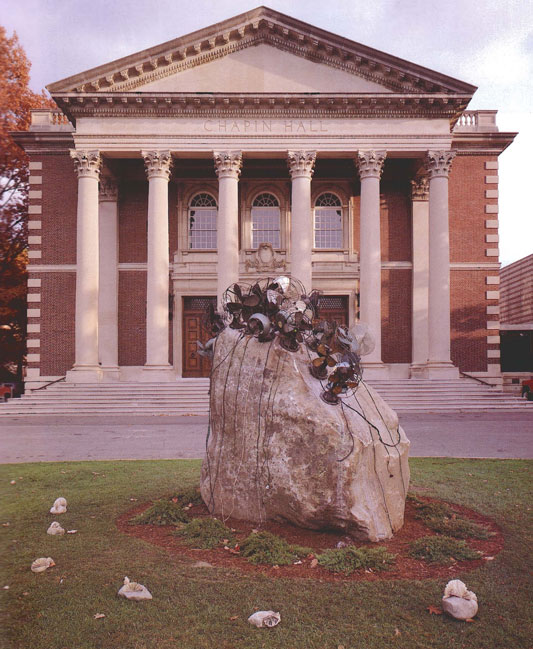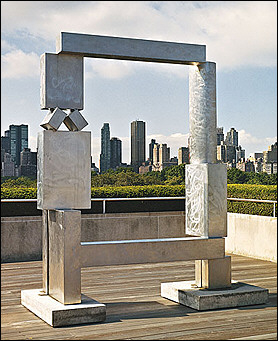Trial begins today in the U.S. Bankruptcy Court in Detroit over whether the city of Detroit is even eligible for the Chapter 9 bankrupcty protection it sought earlier this year. The major point of contention is whether Detroit may, under the Michigan constitution, seek bankrupcty in a way that would reduce pension payments (as it would reduce payment to all its creditors).
Nicholas O'Donnell

Recent Posts
Detroit Bankruptcy Eligibility Trial Begins, Art Collection Could Hang in the Balance
Topics: American Alliance of Museums, Ford Bell, Detroit, Bankruptcy, Detroit In, Kevyn Orr, Detroit Free Press, Detroit Bankruptcy
Appraisers Association of America Art Law Day at New York University November 8, 2013
The Appraisers Association of America is hosting its annual Art Law Day on November 8, 2013 at the Kimmel Center at NYU. The schedule, from the event page, is below. This is always a content-packed and thought-provoking day. They keynote address about legislation for authentication experts should be fascinating, and is particularly timely. See you there!
Topics: Karen Sanig, Yuri Yanchyshyn, AXA Art Insurance Corporation, Christopher Robinson, New York University, ARIS Title Insurance Corporation, Steve Pincus, GV Art Conservation, John Cahill, Theresa Melchiorre, Citi Commercial Bank, Art Law Day, Judith Pearson, DePaul University of Law, Yael Weitz, Chris Marinello, Ralph Lerner, David Gorenberg, Appraisal, Jill Arnold, Laurie Rush, Betty Krulik, Events, Simon Hornby, DeWitt Stern Group, Elizabeth von Habsburg, iGavel Auctions, Herrick Feinstein LLP, Appraisers Association of America, Terry Shtob, Art Recovery International, Lark Mason, IRS, Crozier Fine Arts, Mishcon de Reya, Patty Gerstenblith, Dean Nicyper, Winston Art Group, Period Furniture Conservation LLC, Michael McCoullough LLC, Withers Bergman LLP, Gloria Velandia, Judith Bresler
The Center for Art Law has a thought-provoking piece about the intersection of property rights and Banksy’s “residence” in New York right now. Mayor Bloomberg went on record too as saying he considered graffiti, and implicitly the works themselves, “a sign of decay.” It’s hard to see a court making an exception in New York City for graffiti, no matter what the art world says.
Topics: David Hammons, Rock Fan, Public Art, Graffiti Art, Williams College, Michael Bloomberg, Banksy, Chapin Hall, Eugene Johnson, vandalism, Center for Art Law
Lauren Clay, the David Smith Estate, David Dodde, and Fair Use: Are We Learning Anything?
A pair of recent disputes over sculpture, fair use and moral rights highlights the ongoing concern that Prince v. Cariou has made things worse, not better. The first concerns the estate of sculptor David Smith, and sculptor Lauren Clay. As Art in America put it, “Clay's works replicate the shapes of Smith's large metal ‘Cubi’ sculptures at tabletop scale in materials such as paper, and with faux wood grain or marble finishes.’ The Smith estate, through its reprsentatives at VAGA, took issue with this as a violation of Smith’s copyright. During the discussion, VAGA apparently proposed an agreement in which Clay would agree either not to sell the works, or only to display them with a disclaimer that the works were not authorized.
Topics: Donn Zaretsky, Yellow Submarine, Art in America, La Grande Vitesse, Prince v. Cariou, the Donald Smith Estate, Visual Artists Rights Act, Sergio Muñoz Sarmiento, VARA, Alexander Calder, Copyright, Fair Use, Lauren Clay, David Dodde
Free Speech, Fair Use, and Meaning—Recapping An Evening of Copyright and the Visual Arts at the Sotheby’s Institute
Last night was a fascinating evening at the Sotheby’s Institute in New York, where Judith Prowda was celebrating the launch of her new book Visual Arts and the Law (Lund Humphries 2013). The book, not at all incidentally, is a must-have.
Topics: free speech, Richard Prince, Amy Adler, Campbell v. Acuff-Rose Music, Judith Prowda, Canal Zone, Patrick Cariou, Lund Humphries, Boies Schiller, American Society of Media Photographers, Yes Rasta, Kirkland & Ellis, NYU Law School, Events, Picture Archive Council of America, Shepard Fairey, Dale Cendali, Copyright, Hope, Visual Arts and the Law, transformative, First Amendment, Associated Press, Sotheby’s Institute, Fair Use
Detroit Emergency Manager Expects DIA Collection to Bring Revenue
As the controversy around the possible sale of the Detroit Institute of Arts’ collection continues to swirl, Emergency Manager Kevyn Orr has given some of his most pointed comments to date about his expectations.
Topics: Diego Rivera, Michigan Attorney General, Judge Rhodes, Christie's, Detroit Institute of Arts, Bankruptcy, Michigan Constitution, Bill Schuette, Kevyn Orr, Detroit Bankruptcy
"Selling the Museum's Collection: Is Deaccessioning Ever Appropriate?" at Columbia October 28, 2013
A reminder that two weeks from Monday, I will join a panel discusion at Columbia Law School entited "Selling the Museum's Collection: Is Deaccessioning Ever Appropriate?" From the event description:
Topics: Donn Zaretsky, Roberta Smith, Deaccession, Pippa Loengard, Detroit Institute of Arts, the Art Law Report, Events, Columbia Law School, Nicholas O'Donnell, New York Times
IBA Annual Conference Starts Today in Boston
I’ll be at the International Bar Association Conference all week here in Boston, starting tonight. Among others, I’m looking forward to the sessions below (the first featuring my partner at Sullivan & Worcester, Laura Steinberg, the trademark panel featuring my partner at Sullivan & Worcester Kim Herman, and others given by the Art, Cultural Institutions and Heritage Law Committee). If you follow the Art Law Report and you’ll be in attendance, welcome to Boston, and drop a line or a Tweet.
Topics: Laura Steinberg, Annual Conference, Kim Herman, Sullivan & Worcester LLP, Events, Copyright, Boston, IBA, International Bar Association
Fair Use and Social Utility: Google Books Case Could Drive Copying of Visual Arts in the Name of Access
Comments by the federal judge overseeing the copyright dispute arising out of the Google Books project could portend a lasting effect on reproductions of visual arts. Elevating the question of social benefit in a fair use analysis, Judge Denny Chin of the U.S. District Court for the Southern District of New York posed a question that, applied broadly (which is no theoretical proposition where Google is involved) could turn fair use analysis on its head. Time will tell if the comments were oral argument musings or something more lasting.
Topics: Google Books, 17 U.S.C. § 107, Copyright, The Authors Guild, Judge Denny Chin, Fair Use
Coverage of Lessig "Lisztomania" DCMA Takedown Lawsuit Continues
News media have started to pick up on the lawsuit filed in August by Lawrence Lessig, which challenges takedown notice practices by Liberation Music under the Digital Millennium Copyright Act of 1998 (the “DMCA”) in relation to Lessig's lecture series later posted on YouTube, which featured third party content creators and the song "Lisztomania" by the French band Phoenix, whose copyrights Liberation apparently claims it enforces.
Topics: Massachusetts Lawyers Weekly, Lawrence Lessig, Lisztomania, Copyright, Liberation Music Pty Ltd




